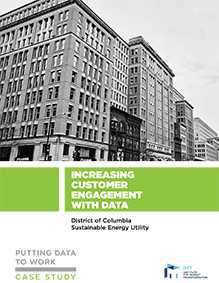District of Columbia Sustainable Energy Utility
Under its 2012 Sustainable DC plan, the District of Columbia established targets that include reducing greenhouse gas (GHG) emissions by 50 percent by 2032 and by at least 80 percent by 2050, including a citywide energy-use reduction target of 50 percent by 2032. In December of 2017, Mayor Muriel Bowser furthered that commitment by pledging that the District will be carbon neutral by 2050.
So, how will it achieve these targets? The District of Columbia Sustainable Energy Utility (DCSEU) is one of the primary means by which the District reduces energy consumption in its building stock through training, outreach, engineering consulting, and incentives for efficiency projects.
This case study examines how the DCSEU uses benchmarking data to engage customers and increase participation in its incentives and efficiency programs. It explores how the DCSEU combines whole-building data from the District’s benchmarking ordinance with other customer- and building-specific information to engage customers and increase participation in incentive and efficiency programs, as well as track metrics related to efficiency program participation, including estimated energy savings, using building performance data over time. Readers of this case study may also be interested in “Putting Data to Work: Outreach Strategies for Cities and Efficiency Administrators,” a four-part tool to provide energy efficiency program implementers with step-by-step guidance for contacting and engaging customers to undertake energy efficiency projects.
This case study is part of IMT’s Putting Data to Work toolkit. This comprehensive toolkit is the result of a three-year pilot project that aimed to use building performance data and asset information to help city government sustainability leaders, utilities, and efficiency program administrators and implementers make more informed business decisions and increase building efficiency. The project examined energy efficiency program design and delivery in the District of Columbia and New York City to produce a toolkit of best practices, actionable tools, and case studies to enable other local governments, utilities, and efficiency program implementers to replicate successes. The full toolkit, as well as details on upcoming blogs and webinars associate with the project, is available at imt.org/PuttingDatatoWork.
